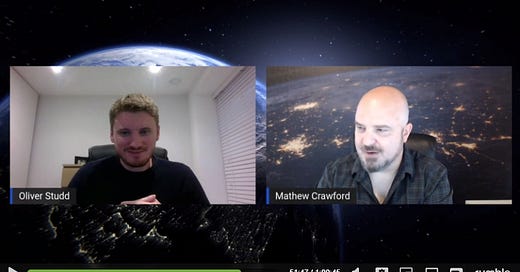Banking Governance: A Discussion with Oliver Studd About Valhalla Network as a Solution to Community Banking
The Bitcoin Wars Part XIX
Find other Bitcoin Wars articles here.
Monday I had the pleasure to speak with my friend Oliver Studd who is the CEO of Valhalla Network, a Decentralized Autonomous Organization (DAO) focused on the creation of community banks. Oliver found a passion for productive banking upon taking classes with Economist Richard Werner, which he talks about in our interview. Werner is responsible for one of the great practical economic achievements of the past century, which was to investigate Japan's economic rise and stagnation in order to determine how the monetary and banking systems really work. You can read about that story in his book Princes of the Yen (also a documentary).
Community banks are one of the small number of most undervalued entities in finance. Locally run, they are better at deploying capital to talented local (usually small, sometimes medium) business developers with low risk, and thus low interest rates. Spreading community banks around the world is one of the keys to bringing more of the world's technology to people who want and need it. These are generally the technologies of communities, not the technologies of centralized control and surveillance. Small businesses are the vehicles for artisan craftsmen to interface with world markets, and also for local farmers to feed their communities.
Check out our conversation on Rumble.
You can read more about Valhalla Network, including the white paper, here. This is one of the best cryptocurrency projects I've heard about over the past several years.
You can also watch us on YouBoob or other outlets.
I went into the conversation with a migraine, but I survived by letting Oliver drive most of the conversation. Were time not an obstacle, I would have wanted to take more time out and talk about the ways in which banks drive the money supply, and how the difference between a productive and unproductive money supply rests on the composition and incentives of the banks. Oliver made sure to insert that into the conversation, but I would have loved to have drawn that topic into its own hour because the twentieth century saw a strange and perhaps Orwellian process of hiding from the public how banks and monetary policy really works. Here is a great interview with Oliver's mentor and collaborator, Richard Werner, that goes deeper on the topic:
Here is another one that I haven't yet watched myself, but plan to.





This gives me hope, Mathew. Thanks for your work in this area - along with everything else you are doing!
Yes a banks motives and consequences of their decisions sets the tone. Large banks too big to fail create the liability for us all